Become a Creator today!Start creating today - Share your story with the world!
Start for free
00:00:00
00:00:01

True Crime (part 2) with Eve Lazarus
In this week's episode, Brook and Sarah are joined by Eve Lazarus to share her experiences writing about true crime in Vancouver and British Columbia.
Discussed in order
Cold Case Vancouver (2015) Eve Lazarus
Murder by Milkshake (2018) Eve Lazarus
In Cold Blood (1965) Truman Capote
The Blooding (1989) Joseph Wambaugh
Who Killed Janet Smith (1984) Edward Starkins
The Pickton File (2007) Stevie Cameron
About Eve Lazarus
Cold Case Canada Facebook Group
For more information
Instagram: @cluedinmystery
Contact us: hello@cluedinmystery.com
Music: Signs To Nowhere by Shane Ivers – www.silvermansound.com
Transcript
This transcript is generated by a computer and there may be some mis-spellings and strange punctuation. We try to catch these before posting, but some things slip through.
Transcript
Introduction to Hosts and Guest
00:00:11
Speaker
Welcome to Clued in Mystery. I'm Sarah. And I'm Brooke. And we both love mystery. Hi, Brooke. Hi, Sarah. We have such a special day today. I know. I am so excited.
00:00:36
Speaker
Today we are interviewing Eve Lazarus. So I will begin by reading Eve's bio and introduce all of you to her.
00:00:46
Speaker
Eve Lazarus is a reporter and author, and she hosts and produces the Cold Case Canada True Crime Podcast. About 20 years ago, a series of events led to her first book, At Home With History, and the idea that a house has a social history and comes alive through the people who lived inside its walls. Sensational Victoria and Sensational Vancouver continued the theme.
00:01:11
Speaker
adding stories about bootleggers and brothels, corrupt cops, and murder. By the time she wrote Cold Case Vancouver, Eve realized that she was writing historical true crime. Blood, Sweat, and Fear tells the story of Inspector J.F.C.B. Vance
00:01:28
Speaker
Vancouver's first forensic investigator and murder by Milkshake tells the story of Esther Castanelli's arsenic death in 1965 by her husband, Renee, a CK&W radio personality. Her most recent book, Cold Case BC, the stories behind the province's most intriguing murder and missing person cases, has been on the BC Best Sellers list for the last 12 weeks, 10 of those at number one.
Challenges in Writing True Crime
00:01:57
Speaker
Welcome, Eve. We're so honored to have you join us today. Oh, I'm thrilled to be here. Thanks so much for having me. Yeah. So, Eve, I'm very excited to be speaking to you because I'm also in Vancouver and have read many of your books. And so it'll be so great to have this conversation about true crime with you.
00:02:18
Speaker
So Brooke and I have talked a little bit about true crime on a previous episode. And one of the things that I wanted to hear from you was about how with fiction, an author has the freedom to invent, but with true crime, there's really no room for that invention. How do you tell a story when you don't have access to the people and you need to focus on the facts?
00:02:44
Speaker
question. Obviously I don't have access to the victims but I do have access to their friends and their family and that's even in cases that are 70 years old and that was really my first one and it's probably the best way to explain that is to give you an example if that's okay. In my book Cold Cape Vancouver came out in 2015 and I wrote about Jenny Conroy. She was a 24 year old
00:03:13
Speaker
North Bank is a war worker and she was murdered in 1944 and I'd almost finished the book and I got a call one day from the archivists at the North Bank of the museum and the archives went and spent a lot of time down there so I knew her quite well and she knew what I was doing and she called me up and she said that they'd just come into the possession of this photo album and it had pictures of the Conroy family from
00:03:40
Speaker
around 1900 to up to the early 1940s and inscribed in the album cover with the name Jenny Conroy and Diane the archivist had done some research and she found out that Jenny had been murdered and her case was never solved and you know I thought oh my god you know I've just finished this book too bad I can't include it so I wrote up a story on my blog and I put you know a couple of photos from this photo album and
00:04:09
Speaker
took a photo of Diane holding the album and just sent that out to the world and said, the next day I got this note from Jenny's niece and she'd been born years after aunt died and it was kind of a family secret that she just pretty stumbled over. She'd seen a photo of this woman and asked if fatherhood was and she said he told her it was her aunt that had been murdered and didn't really want to talk about it.
00:04:39
Speaker
It turned out that Jenny was an unmarried mother and she'd given her baby up for adoption. Back in the 40s, this was quite a scandal. The police had leaked it to the media and the newspaper reports the time was just horrendous. They basically blamed her for her own murder. Anyway, when Mary, her adopted daughter, had gone looking for
00:05:07
Speaker
her biological family you know back in I guess probably 25 years ago and at that time she'd done a bunch of research and she'd got hold of all her adoption records and things like that and she'd been able to to put together quite a story and connect with her family in Canada. She didn't know she'd filled up to live in New Zealand and Debbie had put me in touch with her and it was fascinating you know I called up my editor and I said wow
00:05:35
Speaker
such a great story, I really want to include this in the book. And she said, well, you've got a week because most of these stories take months of writing and research. And Debbie and Mary and I kind of collaborated on this story. And it became the first chapter of my book. And I think probably the most powerful in there, having these voices that were there. And I was able to source all the original newspaper clippings. I had the inquisition.
00:06:04
Speaker
up to death, which, you know, had a ton of information. And I got through a completely different source. I came across a client thing photo to autopsy photos.
Uncovering John Vance's Forensic Materials
00:06:13
Speaker
And at one point, I even had her hair and gravel from the client thing filling out of these little envelopes onto my desk. It was quite intense.
00:06:28
Speaker
Oh my goodness. Did that kind of answer your question in a long, long roundabout way? Wow, that must have just been a almost surreal experience. Well, it got even really more bizarre because after I put the story together, I was starting to read the newspaper clippings about
00:06:57
Speaker
the investigation or lack of support. It wasn't a murder. But they brought, West Vancouver, she died in West Vancouver, and the police forces, you know, were pretty decimated with the war. They did a pretty lousy job, and they brought over Walter Mulligan, who was Detective with the Vancouver Police, and also this guy called John Vance, and he was the forensic investigator. And when I read this in the clipping, I thought, oh my God, we had forensics back in
00:07:27
Speaker
1944. That's really cool. So I went to the Vancouver Police Museum and Archives and started to do a bit of research about it. Have you been to the building? I have. Yeah, it's a great, it's one of my favorite places in Vancouver. It's amazing. You know, it's kind of that secret. It's so incredible. You still, as you know, have the morgue still intact. It's still got the autopsy suites and
00:07:54
Speaker
And downstairs, which is not open to the public, which actually dances loud. And he founded the building in 1932 to do his forensics. And, you know, it turned out this incredible story that he was one of the first forensic scientists in North America. And, you know, the first one connected to a police department. And then I got really obsessed with finding out more about fans. I found his family, decided to do a book on him.
00:08:22
Speaker
And once I got to know some of the family, he died in 1964, right? So I got hold of some of his grandchildren that had met him and knew him when they were children. And one of them told me about these boxes that she'd helped him pack up back in early 1960s. And she said, oh yeah, there were all these climbing photos and all this incredible information. And it's probably got thrown out decades ago.
00:08:48
Speaker
I emailed everyone I knew from the Vance family and I said, well, could everyone just check their attics and, you know, their basements and just see if any of this information, you know, still exists. And I got this call and they'd found this grandson who lived on Gabriola Island, found seven boxes that were sealed. They'd been there in his garage for decades.
00:09:14
Speaker
And when we got them, we opened the first box. It was just like, you know, winning a lottery for a researcher. It was so incredible because it was all his material. It was his case notes, his diary with all photos and just incredible information. And we opened Janie, his granddaughter, and I opened the first box and the envelope, the padded envelope, and it marked Jenny Conroy.
00:09:40
Speaker
murdered 1944, my genie, right, that I'd been researching. So I opened up, you know, the envelope and it turned out, you know, he obviously was one of the cases that had really stuck with him for all these years and he'd taken it home with him when he'd retired and, you know, and obviously never sold it, and it sold unfortunately, but all the forensic samples were there. And, you know, all these photos and some of the autopsy photos were just horrendous, but
00:10:11
Speaker
It was just so incredible to get this information. That is incredible. I'm just sitting here gobsmacked at how amazing that experience must have been, Eve. And I'm sitting here thinking, as a fiction author, this story would be such a great storyline. You were the detective.
00:10:36
Speaker
As the true crime author, you became a detective in putting this case together and meeting the people and gathering the clues. It's amazing and wonderful. What a fun experience you must have had. It really was. It was incredible, incredible working on that and incredible finding out about this guy that had been essentially lost to history.
00:11:02
Speaker
And even the police museum didn't have all that much information on him. And so they were just thrilled. I was able to put it back to the broker. And the family donated all that material to the police museum where it's been properly archived and put away. And they're planning an exhibit, actually, before, which I'm really, really excited about. Oh, I'm definitely going to check that out.
Working with Victims' Families
00:11:30
Speaker
When you're writing True Crime, how do you avoid sensationalizing the crimes and remain sensitive to the families of the people who are involved in these events? And clearly you had an opportunity to, it sounds like, become quite close with some of these family members. I work really, really closely with the family. You know, I get to know them quite well in some cases.
00:11:56
Speaker
I'm always, I guess that's a front of mind to me when I'm writing something, knowing that they're going to read it. I don't sensationalize the details. I think they're always sensational enough as they are, but I don't shy away from them either. I think people need to care about these cases. I think by writing about them properly, not shying away from uncomfortable details.
00:12:26
Speaker
sort of helped me to do that. I also, you know, Journalism 101, you're always told, never show your source of story before it's published. And, you know, I worked in newspapers for years and magazines, and it's always held to that. But I changed that very quickly when I was writing books. I'm happy to share the interviews with the sources. And in some cases, especially in one chapter in the book where a 14-year-old girl went missing, still hasn't been found.
00:12:56
Speaker
since 1993, so over 30 years. And I worked very closely with her mother and her sister. And we went over draft after draft. And all I think it did was, well, it certainly made them feel better, but it also strengthened the story and made sure I had all the facts correct. Also spoke to the father who'd never given an interview before in all this time. And he was a former RCMP officer. And so I had him on the record and I spoke to the RCMP,
00:13:27
Speaker
where she went missing and they were quite candid with me. Again, because I shared everything and I did the same, I'm just doing a podcast actually about this case. It was Lindsay, sorry, can't get it out there, Lindsay Nichols. She was a 14 year old girl who went missing from Comox in 1993. And again, I've shared all the interview tapes with them as well. And so everyone's feeling quite comfortable. So I guess that's how I do it.
00:13:57
Speaker
I try to always remember that they're reading these cases and another podcast I'm working on the cases in the book is Gloria Moody and one of the highway tears cases and she was brutally murdered in 1969 in Williams Lake while she was away on a weekend with her family and she had a four-year-old and a three-year-old and her four-year-old daughter now is obviously grown out with children of her own and
00:14:26
Speaker
And so I worked very closely with her, but this is something that just destroyed the family, as you can imagine. And so, yeah, I'm really, really sensitive to that and ran, you know, all the interviews by Vanessa and fortunately, you know, she was quite happy to have them in. Because again, it's important for me to, it's not my story. I'm telling someone else a story. And it's really important to me to have their voices in there telling their own story.
00:14:57
Speaker
So I do spend a lot of time with that. I imagine the work that you're doing, these stories really stay with you. Oh yeah.
00:15:07
Speaker
True crime, like many of the subgenres in the mystery space, is currently very popular. And that might mean that the same story is being told by many researchers. If someone has previously covered an event that you're writing about, does that influence you or the way that you do your research or end up telling the story at the end? Typically, I write about people who haven't been covered very much at all. They've just been forgotten. Their case happened decades ago.
00:15:38
Speaker
and it's just been forgotten by everybody except you know their family and friends and you know the most recent case I covered was Lindsay Nichols in 1993 and you know it goes right back to 1944 a 15 year old girl who was murdered in Victoria. So again you know some of them are well known like the babes in the woods I guess would be probably the most
00:16:06
Speaker
a well-known one. And in fact, I'd written about that in Colcates back in 2016. And at the time, you know, I've been obsessed by this case since, you know, God's late 80s when I first came to Canada and went to the police museum and saw the exhibit. I should back up because people may not be obsessed with this case as much as I am. Are you familiar with the babes in the woods? They're the bodies that were in Stanley Park.
00:16:34
Speaker
Yeah, there were two little skeletons that were found in Stanley Park in 1953. And it's just become sort of mythology about Stanley Park being our kind of crown jewel, having these two little skeletons buried there that no one missed or reported missing. And the case was just absolutely intriguing over the years. And I nearly didn't write about it in Cold Coast Vancouver. So I thought, oh, everyone knows about the case.
00:17:03
Speaker
When I went to look where it had been written about, there was barely anything done about it. So I spent a huge amount of time researching that going back to the early newspaper reports, going to the police museum, they had quite a bit of information. At that time in the late 80s, I'm not even sure I was aware of this at the time, but they had the actual skulls of the children on display in the case.
00:17:30
Speaker
And when I found out about that later, that really, you know, impacted me that that could happen. And they actually went on display at the P&E, you know, these actual children's skull, which is just stunning to me. Anyway, I got completely obsessed with this story. It told the story in Cold Cape, Vancouver.
00:17:55
Speaker
talking to police that had worked on the case over the years. I talked to the coroner. In fact, we became quite good friends. She's the identification specialist and she's worked on the case for, I don't know, probably a decade trying to identify these kids.
00:18:21
Speaker
I spent a lot of time trying to also put it into the context of the history because the police have always thought that the mother had killed the children. And I found this as a mother quite terrific. But when I went to the police museum and started going through annual reports from 1947, 1948, when they thought the children were killed, I found three murder suicides in a two-way that the mother had gassed herself
00:18:51
Speaker
for children and then another one where the mother had thrown her two children over a bridge and then jumped off after them. Times were really tough for women back then and really much worse for unmarried mothers. There was no social welfare net and really poorly paid jobs in retail or domestic service were the only things that most women could get and that just didn't allow for women.
00:19:17
Speaker
You know, it became a, okay, I get this, the idea that a desperate single mother killed herself and children kind of made a little more sense. And then, just go very, oh, I guess last February, yeah, it was last February, they actually got enough DNA to put into the DNA data bank in states and they got a hit.
00:19:44
Speaker
And they actually found the family members and the kids were given their names back after nearly 70 years, which is just absolutely amazing, you know, through the magic of genetic genealogy, which is solving so many cases, self of the border. And lucky for me, you know, I found out through a couple of sources that they'd been identified that I couldn't get any more information out of anyone.
The 'Babes in the Woods' Mystery
00:20:12
Speaker
They were keeping it very
00:20:14
Speaker
close to the vest and then I just got a message from this young woman and she told me that the police had been to see her mother, that they told her mother that her uncles had been identified, they'd been murdered, they were the babes in the woods. Can you imagine getting that visit? And anyway, they never heard of the babes in the woods and they googled them and came across my podcast that I'd done about them and
00:20:43
Speaker
they actually tell me the story. So I actually broke this story, which is definitely a high side of my year last year. It doesn't happen very much when you're writing about history and true crime. You don't get to break many stories on cold cases. So this was quite exciting that we found out who they were connected to and who they were. The murder is still unsolved. But I think the important thing was that they're identified.
00:21:11
Speaker
How do you feel about fiction stories that are based on real events? I'm thinking about the series. I think it was last year out about Elizabeth Holmes. So it was called The Dropout. And it was actually based on a true crime podcast that had the same name. What's your take on fictionalizing a true event? Well, I've got to tell you, I haven't seen The Dropout. So I can't talk to that.
00:21:40
Speaker
It sounds bizarre, but I don't watch many documentaries or stories that are supposedly based on real events, because it actually does upset me. Although I am a true crime podcast junkie, I don't tend to watch Dateline or true crime documentaries and things. I've had actually one of my books, Blood, Sweat and Fear, The Inspector Vance, has just been options for a TV series this week.
00:22:09
Speaker
Another one, sort of my milkshake that you mentioned that in the international story about a radio personality who murdered his wife with asking milkshakes. So he could marry the, you know, 20-something receptionist with optioned also for a TV film a couple of years ago. And I think, you know, the explanation of this isn't, oh, I got it, which is incredible, they get made, or one of them does at least. I'll probably hate it.
00:22:35
Speaker
because it will be based on my book, it won't be my book, it won't be, you know, a documentary, it's probably going to be like a dropout, I guess, without saying it. Because, you know, with Murder by Milkshake, for instance, they had an 11-year-old daughter named Janine, and her dad murdered a mum with arsenic.
00:22:59
Speaker
Janine had actually approached me, weirdly enough, at my book launch, which we held at the Vancouver Police Museum. So much of my stuff comes out of the Canadian police museum. It's incredible. But Janine came to my book launch, and we'd set up a cash bar in the autopsy suite. And I was sitting, having a glass of wine, talking to people, standing behind Esther Catasilani, the woman that was murdered through crime exhibits.
00:23:26
Speaker
And Janine came up and said, oh, hi, I'm Janine Castellani. Oh, my God. That's incredible. I'd written a book about this story. This was long before the book came out. I wrote this blog. And lucky for me, I made a mistake. I'd said that, Lolly, this was the mistress, the receptionist.
00:23:49
Speaker
had a six-year-old daughter. And then I got this note and said, oh, no, you're wrong. Lolly had a son and my husband, Don, he's actually been looking for Janine for 50 years. Do you know where we could find her? And I said, oh, no, no, no. I wish because I'd like to talk to her. It's an amazing story. And then this happened about a year later when Janine found the book launch.
00:24:14
Speaker
And I remember saying to her, I said, oh my God, do you know Dom's been looking for you? And she just broke down. She said, oh my God, I've been looking for him for nearly 50 years. And it turned out after her dad murdered a mother, her dad moved him and Janine in with the mistress and her son, if you can believe this, and months when I ended up getting convicted for capital murder.
00:24:39
Speaker
and Janine stayed with the mistress and so on. So they grew up for several years with brother and sister and then he was in jail for murder and I guess Wally met a new man and she dropped off Janine to another relative like a stray dog and she never saw Don again. So what was incredibly exciting for me is I actually brought them back together through this book and through writing about them
00:25:08
Speaker
But it was a very personal story and I became, well, we are, we're very close friends now, Janine, she's a wonderful, wonderful woman and she kind of buried all this for 50 years. And for her, this was very therapeutic telling the story. But it was very important to me that we tell it from Janine's point of view and we give her mother a back of voice because much of the story has been told over the decades.
00:25:35
Speaker
It was told about Rini Castellani, the father, was a very charismatic man. He was a broadcaster at CK&W. He did his stunts. He did his incredible stunts. And he becomes this larger-than-life psychopath. And I didn't want to shy away from that because that was a really interesting part. But I wanted also Janine and her mother to come forward. And I think that was successful in the book. And I just don't know how you would translate that into film. So a very long way of answering
00:26:05
Speaker
I have nothing against it and I really hope they do make my books into a fictional true crime event, but I probably won't enjoy them. Wow. It sounds like you've had some really amazing interactions with people and opportunities to connect people with each other and for you to connect with people because of the work that you've been doing.
00:26:35
Speaker
Well, that's true. Yeah, yeah, I've definitely met a lot of very, very interesting people. I got to know a lot of, you know, the deceased. You know, I feel like, for instance, with his hands, but I feel like I know him probably better than anybody because of all the work and getting to know him, you know, through that research material that, you know, turned up in the garage. Because even he had his private diary from 1934 and it was a year when there were seven attacks on his life.
00:27:05
Speaker
for criminals afraid to go up against in court. And it actually had a bomb sent through, which is now the police museum, but it was, you know, Coroner's Court and the morgue vaccine. And it was actually sent through the police department to the morgue in the mail. Like, you know, if he'd shaken it too hard, it probably would have taken out most of the buildings. It was incredible. He had this photo of it, right? He had homemade bombs and
00:27:32
Speaker
But he'd written all this in his diary about this text on his life. So I was able to use that as, you know, in his voice, which is just magical because, you know, of course I can't make, you know, it's not fiction. I can't make up what he's thinking or what he's saying. But I was reading it and no one else had seen it because it was being locked up in a box for 70 years. And so that was truly incredible to me.
00:28:03
Speaker
One thing that Sarah and I talked about in our earlier episode was that sometimes as a listener or a consumer of this, you can feel maybe a little guilty because you're being entertained by someone's
00:28:20
Speaker
real life tragedy. But I love hearing this from you, Eve, to learn how much good comes out of uncovering these stories and sharing them with the world. A lot of positive things have come from your work.
Keeping Cold Cases Alive
00:28:39
Speaker
Well, we haven't solved anything. That would be the greatest thing if we found a missing person or if we solved the case through a tip.
00:28:48
Speaker
Part of what I'm doing is intentional. The oldest case was 1993, so this was even two years before DNA came out on the scene. When we're looking at cases in the 40s and 50s and 60s and 70s even, a lot of the evidence wasn't treated very well. It was contaminated, it was lost, it was thrown out. The DNA that could solve these cases through genetic genealogy
00:29:17
Speaker
for example, isn't going to happen because DNA is just not there. The only way these cases are going to be solved is from a tip, you know, get their conventional something. And the only way that's going to happen is if we keep talking about them. And one of the things I did after Cold Case Vancouver came out in 2015 and, you know, again, I got to know a lot of the families and it just didn't feel right to leave it there. Okay, tell the story. It's in a book, you know, so let's
00:29:46
Speaker
move on to something else. It just didn't feel right. So I started off the Facebook page, Cold Case Vancouver, which morphed into a group page called Cold Case Canada, which is still going really strongly. It's got I think 8,000 members or something at the moment and the page has about 23,000 followers. And it's very active and on the day that someone was murdered or they went missing, I'll put up a post with their photo
00:30:14
Speaker
And I'll put up, you know, where to call if you have information. And I just really have connected with so many family and friends. I need a law enforcement, retired detective, for us to get in contact with me about a case that, you know, one of the ones that they couldn't let go that was never solved. And so, you know, I've managed to sort of build up a lot of context through that. A lot of those stories in Cold Case DC, my new book, came from that Facebook page.
00:30:42
Speaker
came from people that actually reached out to me. So that's been really rewarding as well. And hopefully, we have had some credible tips that have passed on to the police. Now, whether anything's happened with that, I don't know, because police won't talk about unsolved murders ever, even if they're decades old and no one's looked at them or blown the dust off them in decades.
00:31:10
Speaker
And part of the problem with these really old cases, especially in rural areas with RCMP detachment, is they haven't been digitized. So these cases are sitting in banker boxes, in storage offices somewhere, and no one's taken them out to look at. The RCMP are changed over probably every five years or so. They're moved along somewhere else, and a new person comes to take over the file.
00:31:39
Speaker
barely do they get a chance to look at current cases, let alone dive into cold cases. And so it becomes really frustrating for the family, particularly because they can't get any information at all. And we know that no one's working on this. So at least having them out there, having their story out there, hopefully makes people care. And maybe prods, you know, like, you know, fantasies, prods police to take another look.
00:32:08
Speaker
And maybe there is DNA sitting in a box somewhere that makes a test, but someone has to physically go look. So you mentioned that you don't watch a lot of True Crime, but you listen to a lot of True Crime podcasts. How do you know that you're going to enjoy something when you start listening to it?
00:32:34
Speaker
Well, first thing, if it's a couple of hosts and they start on with five minutes to a chitchat that has nothing to do with it, that's me out. I can't listen to that. And if the host is having fun, you know, there's so many of these, you know, they pass them off with our true crime and I kind of, I can't think of some of the more well-known ones, but you know, it's true crime comedy. I just don't understand that.
00:33:03
Speaker
just beyond my comprehension, how you can have fun with someone's murder or someone's missing child. So that's the complete turn off for me. I'm not going to listen to anyone that's not taking this seriously.
True Crime Podcast Preferences
00:33:19
Speaker
I also want to know that they've done some original research and hopefully done some interviews or at least connected with the family and friends to let them know what they're doing.
00:33:30
Speaker
And I don't believe most of these true crime podcasts do that. It just doesn't sound like they do it all. It doesn't sound like they connect with law enforcement in many of these cases. And while, you know, unsolved, you know, as I was just babbling on about, police might talk to you about unsolved murders. Retired detectives will. So if you do a bit of, you know, snooping around as I do, you will turn up retired detectives. And, you know, if you're respectful and serious,
00:34:00
Speaker
they will talk to you. There are also a lot of information that you can get. Now it costs money to get inquests from old cases, but you can get phenomenal information that is just not out there. I'm not interested if someone's just telling me a story that's been ripped off newspaper database and talking about wild speculation. I've heard some of my cases
00:34:26
Speaker
And I've stopped listening to other people doing them because it just drives me nuts. You know, I'm screaming at them. No, that didn't happen. That's not true. You know, you can't make this up. You're just making this stuff up. It's not what happened. I guess the other thing with me, I'm not interested in the murder. I have done some call cases because I do find it interesting to follow the police investigation and
00:34:55
Speaker
And just I think it gets a bit relentless when you don't hear any solved cases, you know, it makes it sound like the police never solved anything, which is completely not true. And so I like doing consult cases to show, walk through the police investigation, because they will happily talk to me when they're solved. So I can get a lot of great information that way. And I think that's really interesting, you know, a case after 40 years was solved safely.
00:35:20
Speaker
through a Mr Big Sting, or through genetic genealogy, or it's sold through a TIP, I think that's really fascinating. But I'm not interested in the murder, and even with these solved cases, I really play them down. So I don't listen to podcasts about serial killers and stuff like that. I just, I can't listen to them. I guess I'm just not interested in them. But I am interested in, you know, well done true crime podcasts that are really well researched.
00:35:50
Speaker
In the end though, I want them wrapped up in a really riveting story, a riveting true story. And I don't think that that's difficult. I think, you know, while I'm writing non-fiction or true crime, and I'm obviously not making anything up, I'm quite a purist in that way, I do try to use all the tools of fiction, you know, to bring colour into a story.
00:36:15
Speaker
I talk about the place or setting, I try to get the stories to sense, you know, murder by milkshake, I want you turning the page like you would with a thriller. You know, that's my goal. And I want strong characters in them. But they're real people, but, you know, I do everything I can to develop, you know, their character as I tried to do with the Castellanis through Janine and their friends and other people that knew them. And, you know, with Vance,
00:36:43
Speaker
with his own materials and again with people that knew him.
00:36:49
Speaker
Well, and I think as an occasional consumer of true crime, I think that focus on the characters and the setting. And you tend to provide some context in terms of what was going on at the time. And yeah, I think I prefer that if that's what I'm going to be consuming.
00:37:19
Speaker
Well, I'll have you completely converted over to true crime. And so I think as a final question from me, Eve, who do you look for for, if anybody, for inspiration in the genre? I don't. You know, I read books that I think are brilliant, like True and Capote's In Cold Blood. I mean, that was kind of it.
00:37:48
Speaker
ground-breaker for this genre. And it was a brilliant book, but we've also told, you know, from the murderous point of view, which I don't was, and Joseph Wambaugh wrote a brilliant book, The Blooding, which was the first police investigation using DNA. There are other true crime writers like Ed Starkens wrote, who killed Janet Smith set in the 1920s in Vancouver. I think that's brilliant. Peter Cameron wrote about the Picton murders.
00:38:18
Speaker
in detail and she focused strongly on the victims and their families that were involved. So, you know, I thought she did a fantastic report. She's a terrific reporter as well doing that. So I guess, you know, in that sense, I really admire this stuff. I don't think I really get, you know, enjoy my own inspiration. I think my inspiration comes from actually doing the research and talking to the family and friends.
00:38:45
Speaker
and you know the law enforcement all of that that's what inspires me.
00:38:51
Speaker
This has been so wonderful Eve. I, I've just enjoyed hearing you talk about the behind the scenes of this so very much. It's, I probably listened to more true crime than Sarah, but I don't, um, I, I'm certainly not an expert or consider myself, um, you know, a true crime junkie, so to speak, but I just admire what you do so much. I think that this is just fascinating.
00:39:19
Speaker
Well, thank you so much. I'm thrilled that you're interested. Now it's been wonderful. Thank you so much for joining us today. Well, Eve, this has been such a pleasure. And listeners, I hope you enjoyed this little treat. Well, thank you so much for having me. I really enjoyed being on it. Thank you. Brooke, that was such an amazing conversation with Eve.
00:39:41
Speaker
Oh my goodness. I think I could talk to her all day long, Sarah. For any of you who want to learn more about Eve, please visit her website, evelazarus.com. And she's also got a couple of places on Facebook that listeners can visit. So there's the Cold Case BC Facebook page and Cold Case Canada Facebook group.
00:40:07
Speaker
So thank you everyone for joining us today for this very special episode of Clued In Mystery. I'm Brooke. And I'm Sarah. And we both love mystery. Clued In Mystery is produced by Brooke Peterson and Sarah M. Stephen. Music is by Shane Ivers at Silvermansound.com. Visit us online at CluedInMystery.com or social media at Clued In Mystery. If you liked what you heard, please consider subscribing, leaving a review, or telling your friends.
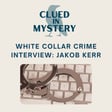
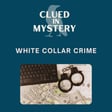
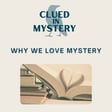
![[re-release] Dorothy L. Sayers image](https://media.zencastr.com/cdn-cgi/image/width=112,quality=85/image-files/61e1c276e3ec42007857cff9/0c9f0c0f-65b5-423a-a129-9414d2b8819e.jpg)
![[Re-release] Christie's Characters: Harley Quin image](https://media.zencastr.com/cdn-cgi/image/width=112,quality=85/image-files/61e1c276e3ec42007857cff9/19b66ded-f629-44f5-8280-f8a4afd4697c.jpg)
![[Re-release] Magic and Mystery with Tom Mead image](https://media.zencastr.com/cdn-cgi/image/width=112,quality=85/image-files/61e1c276e3ec42007857cff9/bf587b93-b2a8-41f6-af97-4772e2c0caa2.jpg)
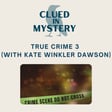
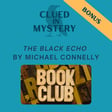
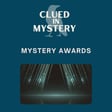
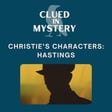
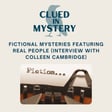
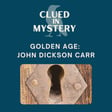

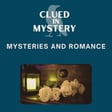
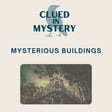
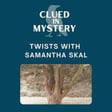
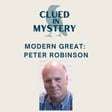
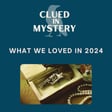
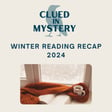
![[Re-release] Celebrity Authors image](https://media.zencastr.com/cdn-cgi/image/width=112,quality=85/image-files/61e1c276e3ec42007857cff9/6bf85c27-5b4b-472c-9f00-1aceb11c14f7.jpg)